Save the nation -- Revisiting overseas footprints of CPC early leaders during their youth
--Starting in 1919, thousands of young Chinese arrived in Western Europe and other parts of Asia to study while working, some of whom, inspired by Marxism, established the earliest CPC groups in local countries and became pioneers of salvaging China in the coming decades.
--Following meetings and discussions with peers, Deng Xiaoping was attracted by Marxism and developed a better understanding of the world and China. From then on, he grew into a firm believer in Communism.
--"Their work-study experience in Europe gave them a far sight, a broad vision and an open heart. It is precisely these three extraordinary qualities that made them outstanding and become leaders of the revolution, of the party and the country," said Duanmu Mei, a historian from the Chinese Academy of Social Sciences.
BEIJING -- As the Communist Party of China (CPC) celebrates its centenary this year, the footprints of the party's founders and early leaders across the world in pursuing a new China have drawn attention from historians and scholars.
Starting in 1919, thousands of young Chinese arrived in Western Europe and other parts of Asia to study while working, some of whom, inspired by Marxism, established the earliest CPC groups in local countries and became pioneers of salvaging China in the coming decades.
MONTARGIS, FRANCE: A BIT OF EMBRYO FOR CPC
A plaque standing in Durzy Garden, downtown Montargis, displays a black-and-white group photo of a dozen of Chinese students. They were participants to the "Work-Study Movement," during which thousands of progressive young Chinese were sent to France, where they worked in factories in Paris, Lyon and Montargis to pay for their studies.
Among those sent to Montargis, a small city around 100 km to the south of Paris, there was a young man called Deng Xiaoping, who later became the Chinese leader and the chief architect of China's reform and opening-up.
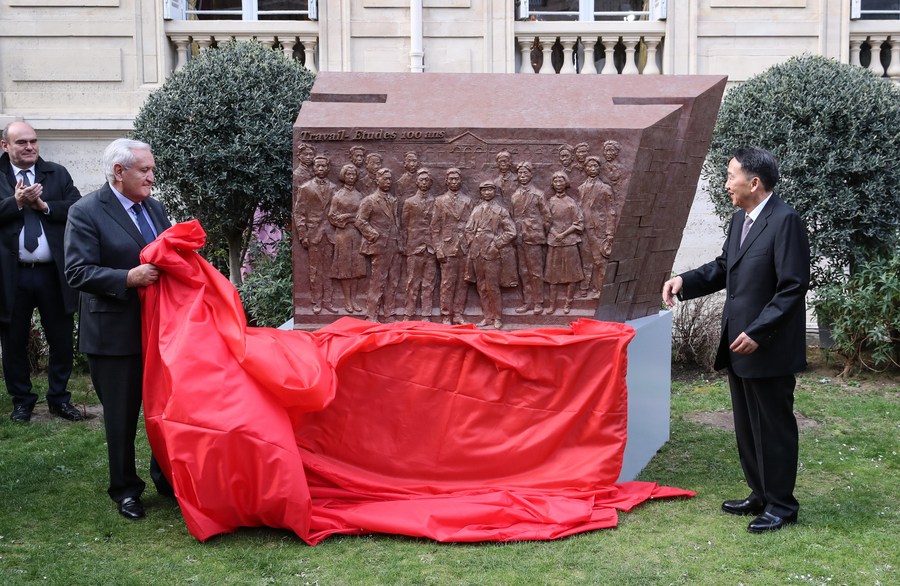
A sculpture of a group of Chinese revolutionaries is unveiled in the China Cultural Center in Paris, France, March 23, 2019. [Xinhua/Shan Yuqi]
From July 6 to 10, 1920, those young Chinese met in the garden to discuss ways "to transform China and the world," and the idea of founding a communist party in China came up.
Cai Hesen, one of the founding members of the CPC and a friend of Mao Zedong, was of particular importance among those students, said Jean-Louis Rizzo, a retired history professor of Sciences Po, a Paris-based research university.
"The ideas drawn from these discussions were sent to a friend of Cai, who stayed in China. That is Mao," Rizzo told Xinhua.
"The two would exchange letters, telling each other that they agree with this theory ... The ideas from Montargis then marked a bit the ferment, the embryo of the CPC," he said.
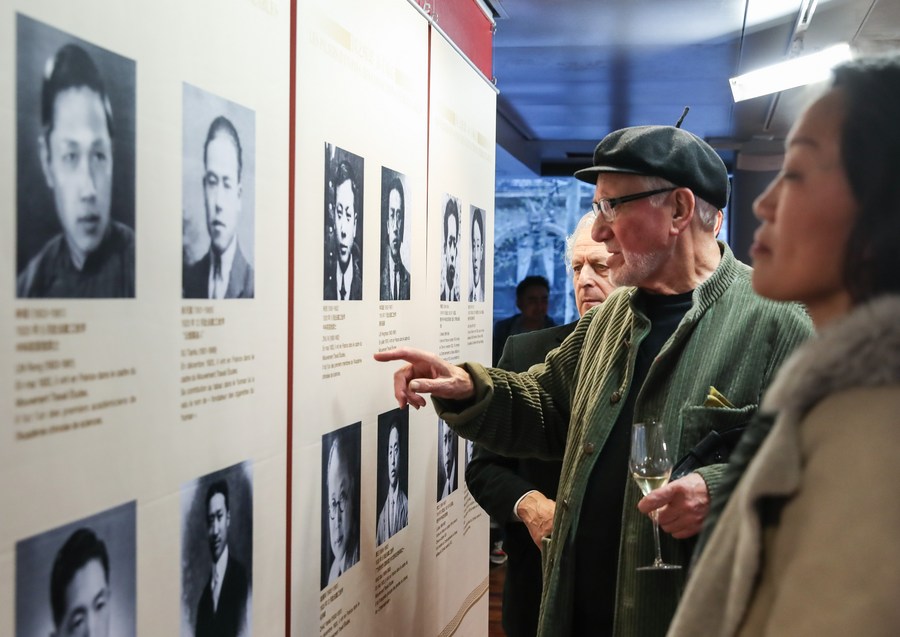
Visitors look at photos displayed in an exhibition marking the centennial of the work-study movement in the China Cultural Center in Paris, France, March 23, 2019. [Xinhua/Shan Yuqi]
Hundreds of meters away from Durzy garden stands an about-300-year-old townhouse. Some rooms in the house were leased to the young Chinese in the 1920s. The building has now been turned into a museum.
An introduction on the first floor of the museum about Deng Xiaoping told visitors how he arrived in France in October 1920, when he had just turned 16.
Deng settled in Montargis and worked there as a laborer in the Hutchinson rubber factory in February 1922, when he experienced a major turning point of his life.
Following meetings and discussions with peers, Deng was attracted by Marxism and developed a better understanding of the world and China. From then on, he grew into a firm believer in Communism.
GOETTINGEN, GERMANY: TEMPORARY HOME TO FUTURE TOP MARSHAL OF CHINESE ARMY
The library of Goettingen, Germany's time-honored city, hosts a series of documents that record the life of Chinese students there about a hundred years ago.
Among the students was Zhu De, one of the major founders of the People's Republic of China and the first of the top ten marshals in the People's Liberation Army (PLA).
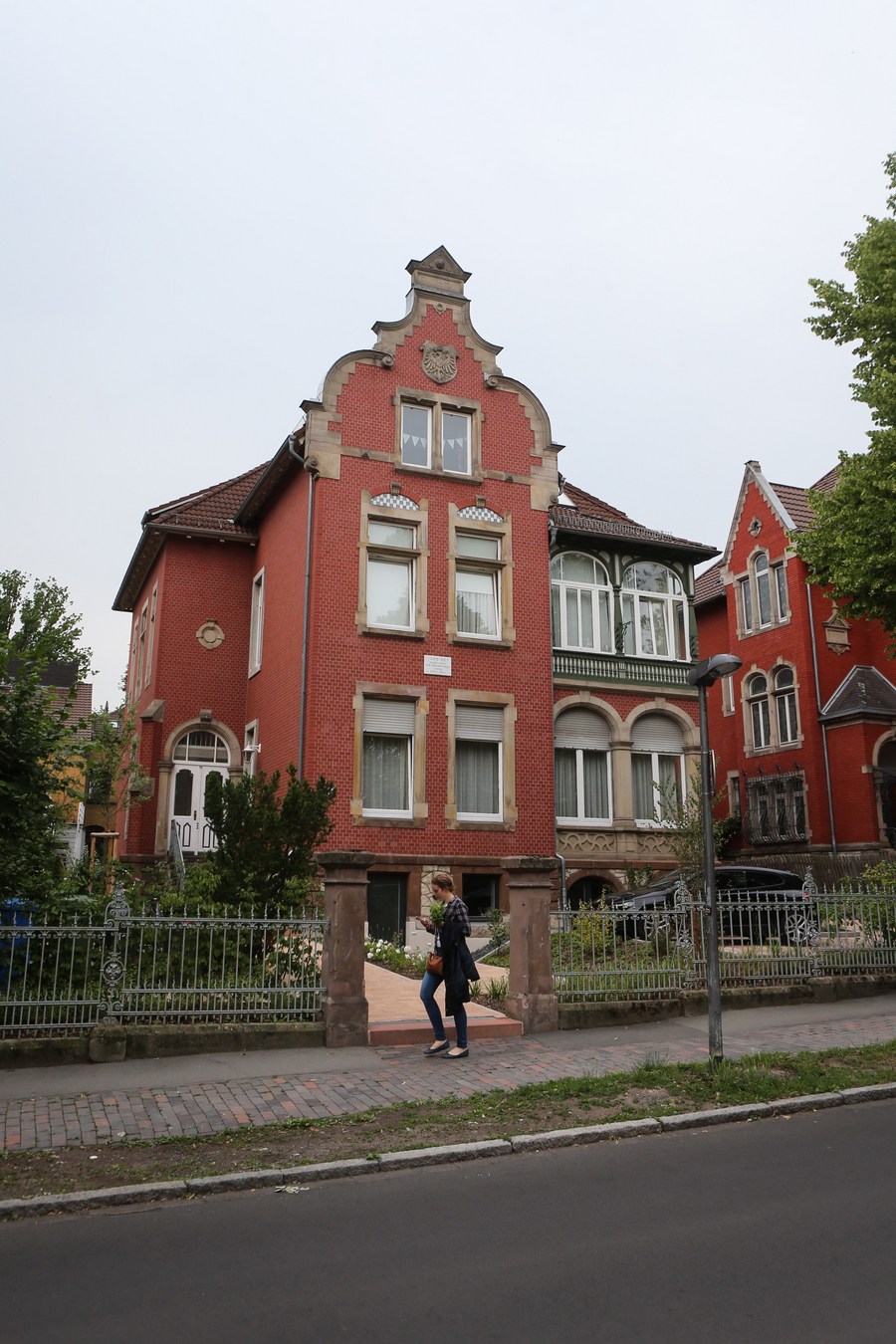
A pedestrian walks past the former residence of Zhu De, one of the major founders of the People's Republic of China and the first of the top ten marshals in the People's Liberation Army (PLA), in Goettingen, Germany, June 26, 2015. [Xinhua/Zhang Fan]
A registration card yellowed with time in the library carries Zhu's handwriting, which shows that he declared himself as a "Chinese" "from Sichuan Province," studying "Sociology, Department of Philosophy" and living in "Planckstrasse 3."
Zhu was born in 1886 and a graduate from China's Yunnan Military Academy. He joined the 1911 Revolution that overthrew the Qing Dynasty and the following wars against the then-sprouting warlords in China, before coming to Europe.
"He was not young and spent a lot of years in the military. He wanted to expand his vision here, in a Western industrialized country," said Rolf Kohlstedt, a historian at the Goettingen City Archive.
Another card can be found is Zhu's household registration report to the local police. On a stamped portrait photo, Zhu was a bright-eyed 36-year-old in a suit.
Zhu stated in the card that before moving to Goettingen, he was in "Wilmersdorf, Berlin."
According to historical documents, Zhu met Zhou Enlai, another future prominent leader of the CPC, who resided in Wilmersdorf in 1922, and joined the CPC with the faith that the party is the only remedy for the then war-torn, poverty-ridden, imperialist-bullied China.
On Planckstrasse street in the eastern part of Goettingen, a two-floor red-bricks house where Zhu was believed to live during his stay in Germany, is still a major attraction for Chinese tourists.
Zhu obtained important insights in military strategic thinking and communication techniques during that time, said Dagmar Yu-Dembski, former managing director of Confucius Institute at the Free University of Berlin, citing memoirs of Zhu's friends and comrades, and historical documents.
"Zhu attended the Chinese language group of the German Communist Party and was an industrious learner, who regularly took part in the weekly debates on Marxist theory and problems of international political struggles seeking independence," Yu-Dembski said.
"Zhu had an active role in the anti-imperialist demonstrations and meetings at that time," she said.
For Duanmu Mei, a historian from the Chinese Academy of Social Sciences, "these outstanding representatives of the Work-Study Movement played an epoch-making role in the future revolution, development and reform of China."
"Their work-study experience in Europe gave them a far sight, a broad vision and an open heart. It is precisely these three extraordinary qualities that made them outstanding and become leaders of the revolution, of the party and the country," she said.
TOKYO, JAPAN: A WITNESS TO CPC PIONEER'S PURSUIT OF SAVING CHINA
Thousands of miles away from Europe, a young Chinese called Li Dazhao went to study in Japan and started living in Tokyo in the winter of 1913. In September 1914, he formally began his study of political economy in Waseda University.
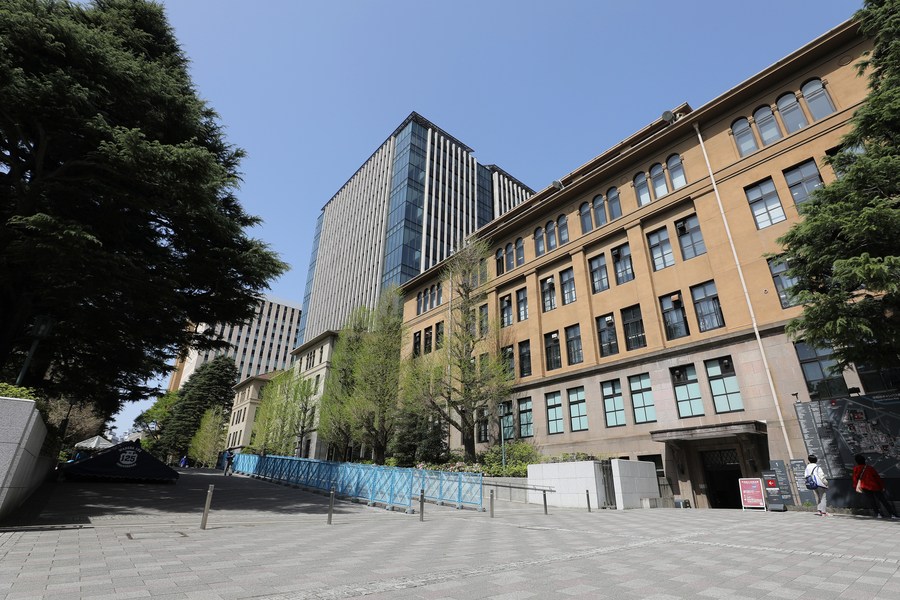
Photo taken on March 31, 2021 shows the main entrance of Waseda University in Tokyo, Japan. [Xinhua/Du Xiaoyi]
In a book written by Honorary Professor Hikotaro Ando at Waseda University, not only Li's transcripts, but also lists in detail of the 11 subjects he had studied at the university and their corresponding teachers are included. "Compared with other Japanese students, Li Dazhao's performance was quite good," Ando commented.
In January 1915, during Li's first year of study at Waseda University, then Japanese Prime Minister Shigenobu Okuma and his cabinet secretly proposed the "Twenty-one Demands" against China. Chinese students studying in Japan responded very strongly to the incident, and Li also actively joined the students' protests.
Li also refused to take courses taught by Kazutami Ukita, a strong advocate of the "Twenty-one Demands," and some other Japanese professors, and published articles criticizing Ukita and the others.
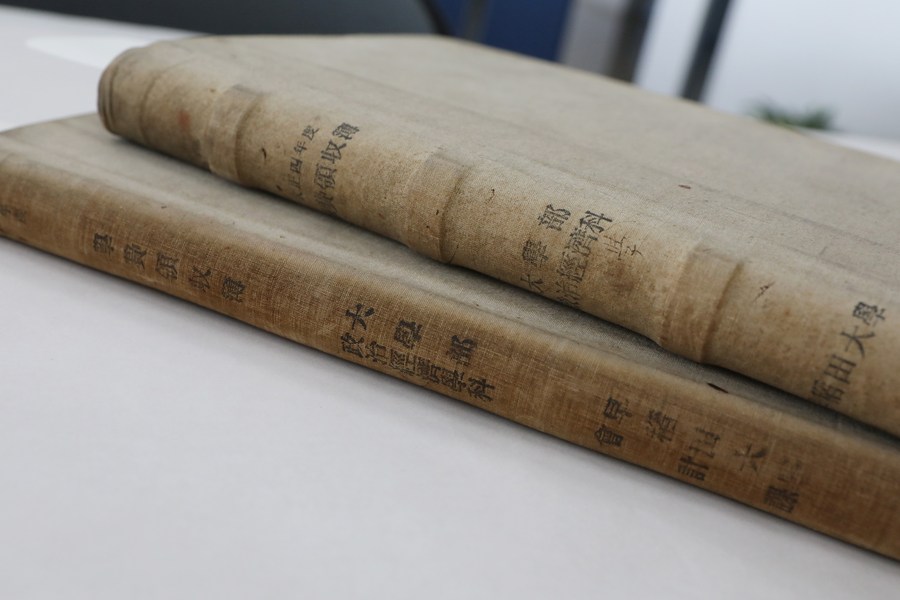
Photo taken on March 30, 2021 shows booklets recording Li Dazhao's payment during his study abroad in Tokyo, Japan. [Xinhua/Du Xiaoyi]
In the spring of 1916, Li, who later became one of the main founders of the CPC and a great disseminator of Marxism, wrote an article titled Youth, lighting a beacon of hope for building a stronger China among the Chinese people.
In April 1916, Li, along with hundreds of Chinese students studying in Japan, terminated their studies in the Japanese universities and returned to China.
In 1927, Li sacrificed his young life in his pursuit of Marxism.
Video reporters: Zheng Huansong, Pan Geping, Li Xiaopeng; video editor: Wu Yao
























